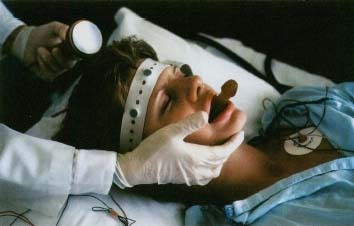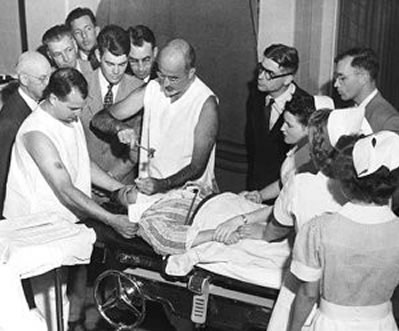For the benefit of anyone blissfully unaware of the contemporary approach to treating mental illness, I hope the group in attendance today has taken its Paroxetine and Bupropion because the news I have may otherwise be unsettling. The glorious people’s future has arrived, comrades, and today we can announce without fear of contradiction that psychopathologies, neuroses and psychoses are no longer legitimate mental illnesses. Just as the pre-Freud world viewed psychiatric symptoms as essentially flaws in one’s character, today’s shrinks shrink from the notion of psychoanalysis or other interactive therapies and instead manage the ailments as if they were brain diseases. Depression, post traumatic stress disorder, bipolar disorder, schizophrenia, borderline personality disorder, schizoaffective disorder: these and other Axis II aches and pains are all due to physiological maladies which in turn affect an individual’s perceptions and internalizations, thereby leading to undesirable behavior which can often be treated with drugs, hypnosis, or electricity. The field of psychology has, in other and less sarcastic words, come full circle, back to the halcyon days where causation is irrelevant, as are whatever pesky societal conditions such a term may suggest. This approach, of course, also eliminates social responsibility since the illness can be treated if only the patient can be made to cooperate. In other words, we as a civilization need not protect one another from the cruelties of war, torture, violent crime or personal violations because the cure is merely a pill, rapid eye movement, pinprick or jolt away.
This tautology came to my attention first hand. After a series of personal losses, I was diagnosed with Major Depressive Disorder, a somewhat benign problem in the scheme of behavioral health. MDD manifests in sad moods, low self-esteem, and a lack of interest in doing fun things that one used to do, like eating pizza and watching television. I had no argument with the diagnosis. In fact I believed that my feelings were entirely appropriate to my situation (a not uncommon interpretation for a patient to develop), just as I was fairly certain that with some good old-fashioned therapy I would be back to my own version of normalcy in short order.
Things did not work out exactly that way.
Things did not work out exactly that way.
I went to a prominent psychologist who referred me to a somewhat less prominent psychiatrist who wrote me a prescription for Fluoxitine (Prozac) and signed me up for Eye Movement Desensitization and Reprocessing treatments, an experience I will reveal momentarily.
But first: better health through chemistry. In the event that the reader is as unfamiliar as was I about the types of antidepressants available these days, here is a brief summary. Prozac, which was my personal hard core drug, is a Selective Serotonin Reuptake Inhibitor, meaning that the pill helps in retaining the neurotransmitter serotonin. Four other popular brand name SSRIs are Celexa, Lexapro, Paxil and Zoloft. Serotonin Norepinephrine Reuptake Inhibitors (which tinker with a combination of neurotransmitters) include Cymbalta and Effexon. Monoamine Oxidase Inhibitors (MAOIs), which are not quite as common as their cousins nowadays, go by the exotic brand names of Marplan, Nardil and Parnate. Until a few years ago, a fourth classification, Tricyclic Antidepressants (TCIs) such as Maneon and Survestor were also popular with prescribers. And finally, not to be outdone by either Serotonin or Norepinephrine, there emerged a Dopamine Reuptake Inhibitor, the most popular of which is Wellbutrin.
So the doctor gave me Prozac. I needed help of some sort and sure enough, within four days I started feeling a little more chipper and a week after that I was popping thirty milligrams a day and actually looked forward to those doses despite an initial reluctance which the shrink described as militant resistance. Around this same time I read in a bulletin from the National Institute of Mental Health that in 1995 an estimated 35,000 adverse reactions to the drug had been reported. By adverse they meant hallucinations, assault, manslaughter and suicide. This same report cautioned that doctors were writing 65,000 scripts a month for this hard core drug. As recently as 2005 the worldwide population of Prozac poppers was thirty-five million.
But first: better health through chemistry. In the event that the reader is as unfamiliar as was I about the types of antidepressants available these days, here is a brief summary. Prozac, which was my personal hard core drug, is a Selective Serotonin Reuptake Inhibitor, meaning that the pill helps in retaining the neurotransmitter serotonin. Four other popular brand name SSRIs are Celexa, Lexapro, Paxil and Zoloft. Serotonin Norepinephrine Reuptake Inhibitors (which tinker with a combination of neurotransmitters) include Cymbalta and Effexon. Monoamine Oxidase Inhibitors (MAOIs), which are not quite as common as their cousins nowadays, go by the exotic brand names of Marplan, Nardil and Parnate. Until a few years ago, a fourth classification, Tricyclic Antidepressants (TCIs) such as Maneon and Survestor were also popular with prescribers. And finally, not to be outdone by either Serotonin or Norepinephrine, there emerged a Dopamine Reuptake Inhibitor, the most popular of which is Wellbutrin.
So the doctor gave me Prozac. I needed help of some sort and sure enough, within four days I started feeling a little more chipper and a week after that I was popping thirty milligrams a day and actually looked forward to those doses despite an initial reluctance which the shrink described as militant resistance. Around this same time I read in a bulletin from the National Institute of Mental Health that in 1995 an estimated 35,000 adverse reactions to the drug had been reported. By adverse they meant hallucinations, assault, manslaughter and suicide. This same report cautioned that doctors were writing 65,000 scripts a month for this hard core drug. As recently as 2005 the worldwide population of Prozac poppers was thirty-five million.
Disillusioned by what I suspected was Eli Lilly’s effort to confuse efficacy with causation, I stopped taking Prozac cold turkey. That turned out to be a mistake. Prozac has a long half-life, which means that it stays in the body for one to two months. Nevertheless, on the third day without it I woke up thinking I had the flu. Headache, stiff joints and a low grade fever were my symptoms and confused was my state of mind because I am very seldom physically ill. It turned out that what I actually had was Prozac withdrawal. I was now quite concerned over the fact that not taking a drug caused those kind of effects. What, I wondered, long term damage is this stuff doing?
I responded by doing what Big Pharma spends billions every year urging us to do: I talked to my well-reimbursed doctor. She switched me to Wellbutrin. Although I did not know it at the time, I was in good company. Twenty million people take it everyday.
The good news is that I stopped smoking due to the influence of this dopamine reuptake inhibitor. The bad news is that I missed the high strung sensation of Prozac. In fact, dopamine seemed to be the one neurotransmitter with which I needed no reuptake. On a subsequent visit I told my doctor that I was feeling depressed again. The solution was self-evident to her: I now take both Wellbutrin and Prozac and—truth be told—I am depressed much less than at any time in the last twenty years.
So what are my complaints? They are but three: Does the imbalance in serotonin or dopamine levels cause the depression? Does the depression itself cause the imbalance? Or is the efficacy coincidental or tangential? The answer to all three questions is that nobody knows.
I responded by doing what Big Pharma spends billions every year urging us to do: I talked to my well-reimbursed doctor. She switched me to Wellbutrin. Although I did not know it at the time, I was in good company. Twenty million people take it everyday.
The good news is that I stopped smoking due to the influence of this dopamine reuptake inhibitor. The bad news is that I missed the high strung sensation of Prozac. In fact, dopamine seemed to be the one neurotransmitter with which I needed no reuptake. On a subsequent visit I told my doctor that I was feeling depressed again. The solution was self-evident to her: I now take both Wellbutrin and Prozac and—truth be told—I am depressed much less than at any time in the last twenty years.
So what are my complaints? They are but three: Does the imbalance in serotonin or dopamine levels cause the depression? Does the depression itself cause the imbalance? Or is the efficacy coincidental or tangential? The answer to all three questions is that nobody knows.
I grew up believing that events affect people. The loss of a family member, sexual abuse, witnessing genocide, overwork, and changes in one’s personal life compile until defense mechanisms are no longer useful and the resulting unhealthy interpretations and ideations converge to create illnesses which may be manifested in physiological ways but which have psychological roots. I actually said something like this to one doctor who replied that if something works, what sense was there in fighting it? What I wish I had said back was that there is little point in curing a person of mesothilioma if you are going to return him to work in the asbestos factory.
My point here runs against the current grain. When I suggested to my Eye Movement Desensitization Reprocessing therapist that her treatment was a combination of hypnosis and cognitive behavioral therapy, she expressed a horror that led her to suspend the treatment. That was fine with me. I had simply pointed out that CBT (God, don’t they love abbreviations?)—which is based on the concept that thoughts cause feelings: control the thoughts and you control the behavior—by itself is useless because (a) patients do not think logically, (b) patients lie, and (c) patients resist. But hypnotize the patient and he or she can be led to overcome all three obstacles and be receptive to the cognitive aspects of EMDR. This might sound a bit sinister and it probably suffers under shades of The Manchurian Candidate. But the brain disease advocates cannot be dissuaded with bourgeois luxuries such as morality and logic. There are millions of nut jobs, head cases and psychos out there in desperate need of manipulation and the psychiatric community is not about to let ethics or reason get in the way of progress.
Consider electroshock, or as it known today, electro convulsive therapy (note how that last word tempers the terror of the one in the middle) or ECT. Performed in the 1940s and 1950s to calm down people who had other ideas, ECT is today used in conjunction with anesthesia a few times a week on patients for two to three months. The treatment causes temporary confusion in the one million people who have endured it, although the confusion sometimes wears off. What often does not wear off is memory loss. Some people with severe depression may welcome a bit of selective memory loss, especially if ghastly events have led to the symptoms. Unfortunately there is no way to specify which memories are wiped out, some memories may eventually return, and the efficacy of the treatment is uncertain because the clinical prejudgment is against psychological-environmental catalysts and in favor of the physiological-genetic, which at the present is unproved. Although I have never had the dubious pleasure myself, I have met lots of ECT survivors. If you ever do, expect to wait a while between your questions and their answers.
Having admitted to suffering from depression, my own credibility is probably in question. That strikes me as reasonable and I certainly take no offense, if such is intended. The fundamental issue, however, is not one of my creation. The issue exists with or without me: is mental illness primarily psychological or physiological, and since this is not a high school course, the correct answer cannot be “a little bit of both.”
The lobotomist Dr. Walter Freeman said it was physiological. He treated the problem by giving the patient a few jolts of electricity and then by placing an ice pick beneath a patient’s eyelids and tapping it with a small mallet, puncturing the frontal lobe. Once inside, he moved the device about two inches into the lobe and tilted it from side to side. His goal was to sever the neural connections between the frontal lobe and the thalamus. Although his theory was inaccurate, the procedure did tend to subdue the nearly 3,500 people he practiced it on. So if, for instance, a patient had a tendency toward manic episodes, a few seconds under the prick and pick would do the trick. Hallucinations? Just let Doctor Feel Nothing apply some conductors. Take that ice pick out of the freezer and let’s get busy. The majority of Freeman’s patient victims had to be taught to eat and use the bathroom all over again. Rosemary Kennedy, for one, was an invalid for more than sixty years after this therapy.
I may be forgiven (and if not, that is fine) for doubts about the propriety of not only the methodology of brain disease proponents but of their assumptions as well. Most people do not come by their mental illnesses quickly. They build up layer upon uneven layer until the fragile balance becomes untenable and then collapses. The suggestion of a quick fix is akin to giving a person Robotusin for lung cancer. Yet somewhere a physician shouts, “But it silenced his cough!”
As of today, February 22, 2011, I have been off all psychiatric drugs for five weeks. I feel very good. Matter of fact, I have far more energy and people say I’m a lot more enjoyable to be around. I will not be returning to a drug regimen. Bear in mind, if some of you are taking these medications and they are working for you, that’s great. Have a nice day. But it does bear considering, I think, that simply spending quality time with nice people goes a lot farther than waiting in line at the drug store.
I may be forgiven (and if not, that is fine) for doubts about the propriety of not only the methodology of brain disease proponents but of their assumptions as well. Most people do not come by their mental illnesses quickly. They build up layer upon uneven layer until the fragile balance becomes untenable and then collapses. The suggestion of a quick fix is akin to giving a person Robotusin for lung cancer. Yet somewhere a physician shouts, “But it silenced his cough!”
As of today, February 22, 2011, I have been off all psychiatric drugs for five weeks. I feel very good. Matter of fact, I have far more energy and people say I’m a lot more enjoyable to be around. I will not be returning to a drug regimen. Bear in mind, if some of you are taking these medications and they are working for you, that’s great. Have a nice day. But it does bear considering, I think, that simply spending quality time with nice people goes a lot farther than waiting in line at the drug store.
Post Script: It is now two months since I wrote this article. I still take no drugs. I am still glad.



.jpg)


No comments:
Post a Comment